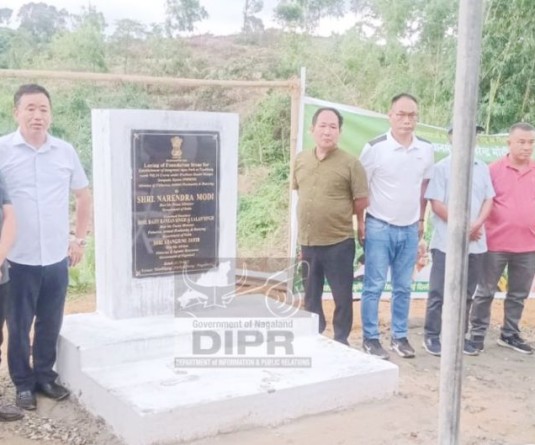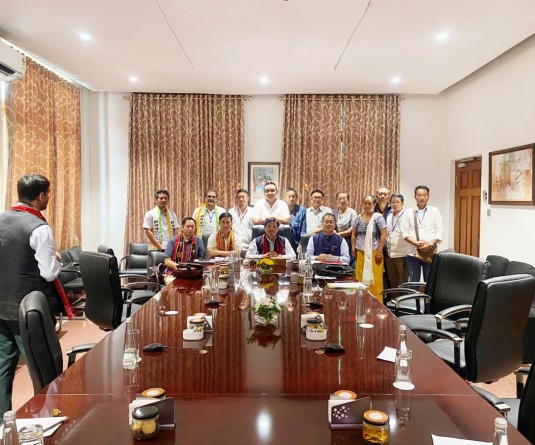
Dimapur, December 13 (MExN): A panel discussion organised by the Naga Scholars’ Association brought out various concerns with regard to the Armed Forces (Special Powers) Act as calls for repeal of the contentious law continue to grow across Northeast India.
Held on December 11 under the theme “Repeal APFSA: Perspective from Northeast India and Beyond,” the discussion was chaired by Professor Paul Pimomo, Emeritus Professor, Washington University. The panelists included Professor Sanjoy Hazarika, academician, journalist, author and International Director of the Commonwealth Human Rights Initiative; Binalakshmi Nepram, Founder-Director of Manipur Women Gun Survivors Network & Global Alliance; Babloo Loitongbam, Executive Director, Human Rights Alert; and Rev Dr Ellen Konyak Jamir, Associate Professor, Oriental Theological Seminary and Member of the Forum for Naga Reconciliation.
According to a press release from the NSA on Monday, Rev Dr Ellen said that the Oting incident was a “reliving of past traumas” for the Nagas and expressed concern about the possibility of turning ordinary grief into complicated grief in the aftermath of such traumatic events as Nagaland is ill-equipped to provide emotional and mental care to a large number of individuals. She said it is a pivotal time in Naga history to call for unity to pursue peace and justice, the release stated.
Pointing out that Nagaland still does not have a State Human Rights Commission; Professor Hazarika highlighted the crucial need to set up the Commission. An urgent demand to hold the government accountable for its inaction is the need of the hour, he remarked.
Loitongbam said the Oting massacre has brought about an opportunity for groups that had been suffering in isolation to communicate. Pointing out that it is not an isolated incident, he suggested forging an alliance amongst the NE states who have shared experiences of living under AFSPA, and for devising a strategy to repeal the law.
Nepram asserted that the “demand for repeal of AFSPA is not an emotional issue, but it is an issue which concerns the process of incomplete decolonization.” India's statement to the UN claiming that it has no domestic wars, contradicted its own report, she said, while questioning why the army is allowed to operate within civilian spaces, if the Act is carried out under the auspices of law and order. “The repeal of the AFSPA is critical since the Northeast is one of the most militarized regions in the world,” Nepram emphasized.
Loitongbam stated that despite the Nagaland Cabinet’s decision to remove the status of the state as ‘disturbed area’, the Central Government continues to maintain the status quo. In regard to judicial response on the constitutionality of AFSPA, he pointed out that regardless of the appeal made in 1997 in the Naga People’s Movement for Human Rights wherein, it asked the Supreme Court to outline the objective criteria for defining a ‘disturbed area’, the apex court turned a deaf ear to this petition. Inf the ongoing process to the demand to revoke AFSPA, the Oting incident has highlighted the need to prosecute soldiers responsible for the killing of civilians under the Indian law system, he asserted. Professor Hazarika viewed that the law's current relevance must be revisited since the condition today is one of peace, negotiation, and discussion. He observed that incidents like the one in Oting could widen the gap between the NE people and stifle conversation.
Nepram drew attention to the significance of political securitization of the region and how it has often been termed as anti-national. She emphasized the need to unite and fight locally, regionally, nationally and internationally for the repeal of the draconian law. A positive outcome will be the greatest “confidence building measure” while a contrary result would put unity and peace process of the Northeast and the nation in jeopardy, she stated.
Loitongbam encouraged the participants to keep the dialogue and engagement alive as it is a decisive time to act and demand for the removal of AFSPA. Further highlighting the Supreme Court’s intervention on fake encounter cases in Manipur, Loitongbam reflected on how killing had stopped from 500 per year to zero. Real security of the nation comes only when its people feel secured and protected, he remarked.
Rev Dr Ellen emphasized on the state's relative tranquility during the last few years, and how the attempt to put things right has been interrupted by the incident. As a symbolic tribute, she read out the names of the fourteen murdered civilians.
Urging the NE people to be united and begin an informed conversation across the board, Professor Pimomo, ended the discussion with questions on what should be done in going forward to repeal AFSPA and what the modes of oppositions and resistance are in terms of strategizing it as the people’s movement, the release stated.





